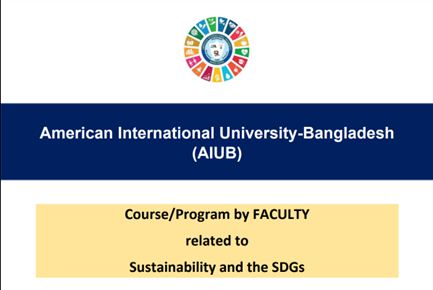American International University-Bangladesh (AIUB) integrates environmental sustainability into its academic framework by incorporating relevant courses across various programs. For instance, the Bachelor of Architecture program includes courses such as "Environment and Design I", "Environment and Design II", and "Environment and Design III" which focus on sustainable architectural practices and environmental considerations. Similarly, the Bachelor of Science in Computer Engineering program offers courses like "Engineering Ethics and Environmental Protection", emphasizing the ethical responsibilities of engineers towards the environment.
In addition to curriculum integration, AIUB has established the Center for Sustainable Energy Research (CSER) under the Dr. Anwarul Abedin Institute of Innovation (D2A2I). This center focuses on sustainable energy research, providing students with opportunities to engage in projects that address climate change and promote environmental sustainability.
Furthermore, AIUB's commitment to sustainability extends to co-curricular activities. The AIUB Environment Club (AEC) actively engages students in initiatives aimed at protecting and preserving the environment, fostering a culture of environmental responsibility within the university community.
By embedding environmental sustainability into both its curriculum and extracurricular activities, AIUB equips students with the knowledge and skills necessary to contribute positively to sustainable development, preparing them to be proactive in addressing environmental challenges in their future careers.
AIUB Sustainable Courses
https://www.aiub.edu/Files/Uploads/total-aiub-sdg-course-mapping.pdf

EEE 4231: RENEWABLE ENERGY TECHNOLOGY
3.00 CREDITS, 2 HRS/WK LECTURE, 3 HRS/WK LAB. PREREQ.: EEE3211
To understand about Basics of Energy, Current Energy Scenario and Fossil Fuel Reserves, Sustainability and Renewable Energy and Importance and Drawbacks of Renewable Energy. To know about Solar Spectrum, Extra-terrestrial Radiation, Radiation on earth surface, Geographical Distribution, Atmospheric Factors, Optimal Tilt, Monthly Averaged Global Radiation at optimal Tilt, Solar Tracking Arrangements. Identify and formulate solar angles, times, radiation and other factors for a given location, date, and time. To become familiarized with solar thermal technologies. This will include a brief review of Thermodynamic cycles, Absorption and Radiation, Solar Thermal Collectors (flat plate and concentrating devices), and solar thermal power plants. To understand the Solar Photovoltaic Technology. This includes the advantage and limitations of PV, Basic Semiconductor Theory of PV cells, I-V characteristic curves, Power rating, Efficiency, Maximum power point (MPP), PV systems and components, Stand-alone PV systems, Grid connected PV systems, Hybrid PV Systems. To perform solar PV calculations as well as design PV systems per given specifications or energy demand. This includes synthesis of information to provide valid conclusions. To learn about Wind flow, Motion of wind, Energy and Power Calculation, Distribution of Wind Speed, Types of Wind Turbine, Components of wind turbines, Wind Turbine characteristics, sizing and system design, Wind Power Converters. To perform Wind Energy calculations as well as design wind turbines per given specifications or energy demand. This includes synthesis of information to provide valid conclusions. To understand Biomass Energy which includes types of biomass and application, Energy content in biomass, Biomass from quickly growing plants, Energy conversion process of biomass, Biomass based fuel, Application of Biomass energy: Biogas and Biofuel. To perform biomass energy calculations. To learn about geothermal energy and different types of energy storage techniques (conventional and Non- conventional). To perform research on different recent trends in renewable energy. The topics include (but are not limited to) Prospects of Ocean, Tidal and Geothermal Energy in Bangladesh, Vehicle to Grid Technology, Smart Grids Technology, Renewable Energy Policy of Bangladesh, Solar Air Conditioning and Solar Cooker, Rice Husking for Electricity Generation: Perspective Bangladesh, Clean Development Mechanism (Carbon Credits) and Zero Energy Buildings
BBA 3233: Ethics, Sustainability, and Communication for Development
https://www.aiub.edu/Files/Uploads/01-course-descriptions---bba-core-courses.pdf#page=8.43
This course investigates fundamental questions about morality, justice, the meaning of life, and the world's beauty. Some questions that might be addressed are: What makes a society just? Do we have any responsibilities in terms of what is right? What is it that makes deeds suitable? What distinguishes a work of art from a non-work of art? Are values only related to one another? Developing critical, evaluative, and writing abilities as a result of the presentation and examination of reasons for different answers to fundamental problems is the way philosophy proceeds.
ECO3115: ENVIRONMENTAL ECONOMICS AND SUSTAINABILITY
One of the most significant and contentious contemporary policy topics is the environment and sustainable economic development. This course will cover the interdependencies between the environment and the economy. It will offer underlying causes of environmental issues, why unregulated markets can occasionally fail in this setting, and various economic solutions for these issues, such as laws, taxes, subsidies, and pollution permit trading schemes. This course aims to provide students with sound knowledge and understanding of the major basic results of environmental economics, covering a wide range of subjects from the economics of pollution control, the economics of natural resource use, and sustainable development to international environmental problems, including climate change. Students will also learn about the costs and advantages of environmental protection. Students who complete the course will be prepared with the skills needed to participate in the debate over environmental policy from an economic standpoint and its impact on sustainable development.
DEV5104: PRIVATE SECTOR FOR SUSTAINABLE DEVELOPMENT
In an ever more competitive economy, in which companies are increasingly held directly responsible for the consequences of their impact on society from an environmental, social, and economic point of view, it is necessary to be prepared to face these challenges in order to strengthen legitimization to operate and to seize all opportunities for growth, innovation, and reputational advantage. The
management of these processes, in the interest of all stakeholders, to create shared value for both the company and the community by outlining a solid and effective social responsibility policy that is well integrated with a company’s strategy requires specific competencies and sensitivities.
